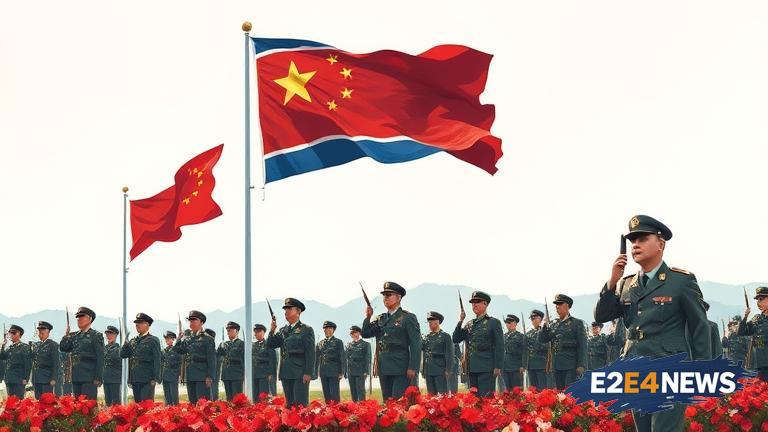On July 27, North Korean leader Kim Jong-un commemorated the 69th anniversary of the Korean War armistice by visiting the Friendship Tower in Pyongyang, a monument dedicated to the Chinese soldiers who fought alongside North Korea during the conflict. The Korean War, which lasted from 1950 to 1953, was a pivotal moment in modern history, pitting North Korea and its ally China against South Korea and a coalition of United Nations forces led by the United States. The war resulted in the deaths of millions of people, including thousands of Chinese soldiers who were deployed to support North Korea. Kim Jong-un’s visit to the Friendship Tower was seen as a gesture of gratitude towards China, which has been a key ally and economic partner for North Korea in recent years. The North Korean leader was accompanied by high-ranking officials, including the vice chairman of the Central Committee of the Workers’ Party of Korea. During the ceremony, Kim Jong-un laid a wreath at the tower and observed a moment of silence to honor the Chinese war dead. The visit was also seen as an opportunity for Kim to reaffirm his country’s commitment to its alliance with China, which has been a crucial factor in North Korea’s ability to withstand international pressure and sanctions. The Korean War armistice agreement, signed on July 27, 1953, brought an end to hostilities but did not formally end the war, as a peace treaty was never signed. The agreement established the Korean Demilitarized Zone (DMZ), which has since become one of the most heavily militarized borders in the world. Despite the armistice, tensions between North and South Korea remain high, with both sides maintaining large military forces along the DMZ. The anniversary of the armistice is typically marked with ceremonies and events in both North and South Korea, as well as in China and other countries that participated in the war. This year’s anniversary comes at a time of heightened tensions between North Korea and the United States, which have been engaged in a diplomatic standoff over North Korea’s nuclear program. The United States has imposed strict sanctions on North Korea in an effort to pressure the country to abandon its nuclear ambitions, but Kim Jong-un has shown no signs of backing down. China, which has been a key player in international efforts to resolve the North Korean nuclear crisis, has called for a more nuanced approach that takes into account the security concerns of all parties involved. The visit by Kim Jong-un to the Friendship Tower is seen as a reminder of the complex web of alliances and rivalries that underpin the geopolitics of the region. As the international community continues to grapple with the challenges posed by North Korea’s nuclear program, the anniversary of the Korean War armistice serves as a reminder of the devastating consequences of conflict and the importance of diplomacy in preventing future wars. The ceremony at the Friendship Tower was attended by Chinese diplomats and other officials, who were invited to join in the commemoration. The event was also covered extensively in the North Korean media, which highlighted the importance of the alliance between North Korea and China. In recent years, North Korea has sought to strengthen its ties with China, which has become a crucial source of economic and diplomatic support for the isolated regime. The visit by Kim Jong-un to the Friendship Tower is seen as part of this effort, as North Korea seeks to reaffirm its commitment to its alliance with China and to honor the sacrifices made by Chinese soldiers during the Korean War. The anniversary of the armistice is also an opportunity for North Korea to reflect on its own history and the role that the war has played in shaping the country’s identity and worldview. For North Koreans, the war is remembered as a heroic struggle against foreign aggression, and the anniversary of the armistice is seen as a time to honor the sacrifices made by those who fought and died in the conflict. The visit by Kim Jong-un to the Friendship Tower is a reminder that, even as the international community seeks to resolve the challenges posed by North Korea’s nuclear program, the country remains deeply committed to its own narrative and worldview.
